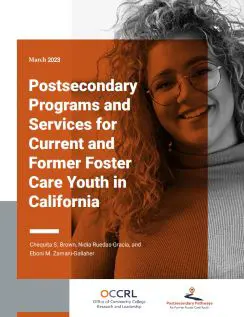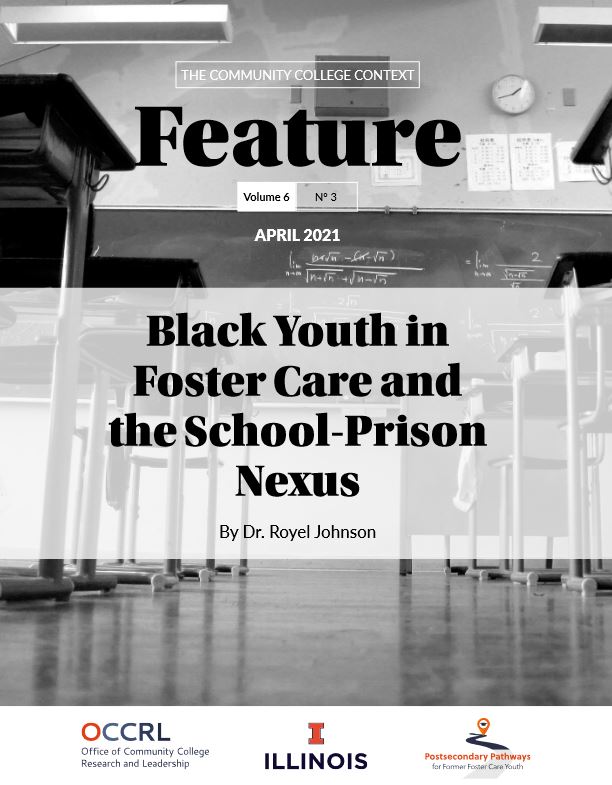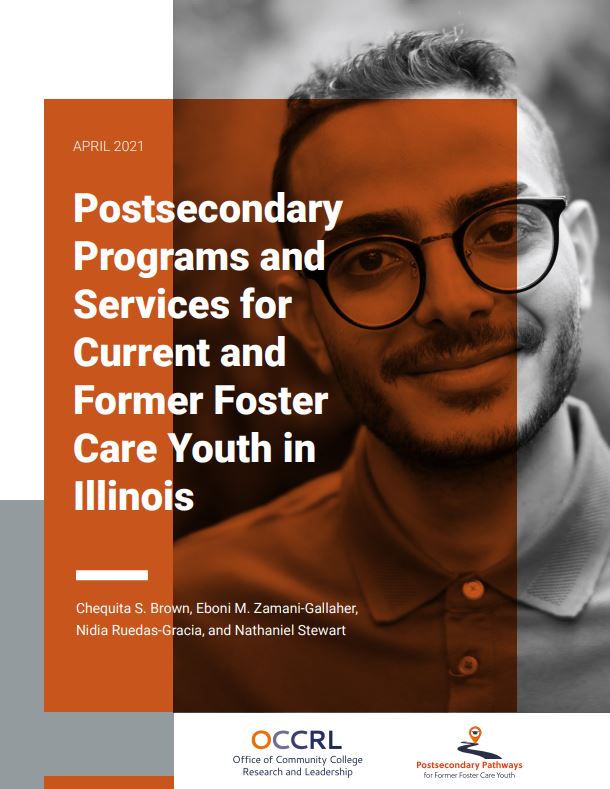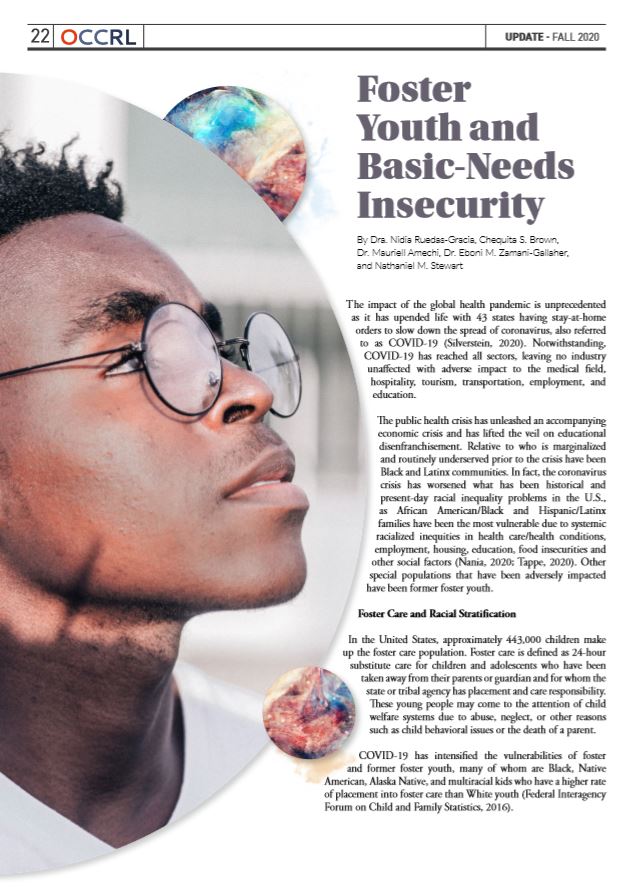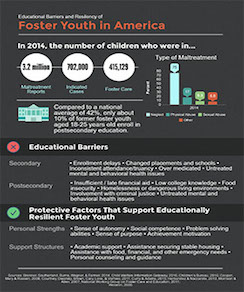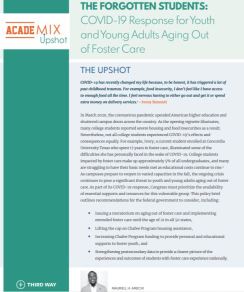
Postsecondary Pathways - for Former Foster Care Youth
This project has been completed and is no longer active.
However, we hope you are able to utilize its resources.
The Postsecondary Pathways for Former Foster Care Youth (PP-FFCY) reflects OCCRL’s commitment to examining and developing postsecondary pathways that support mobility for first-generation, underserved, and minoritized populations, as well as strengthening career pathways to promote seamless transitions from college to careers. This project endeavors to examine postsecondary access, opportunities, and supports for foster youth in Illinois and other states across the county in addressing access and outcomes of FFCY in Career Technical Education (CTE).
Purpose
The Postsecondary Education Pathways for Former Foster Care Youth (PP-FFCY) project is an exploratory study focused on postsecondary pathways for current and former foster youth in Illinois. OCCRL is conducting a comprehensive-needs assessment that provides a descriptive profile of current and former foster youth populations in Illinois; examines postsecondary access, opportunities, and supports for foster youth in Illinois; and addresses disparities in career and technical education (CTE) programs. This project reflects OCCRL’s commitment to examining and developing postsecondary pathways that support mobility for first-generation, underserved, and minoritized populations as well as strengthening and supporting career pathways to promote seamless transitions from college to careers.
Resources
OCCRL aims to increase postsecondary awareness, access, and attainment for current and former foster care youth by providing information on programs and other resources that offer holistic support and services. View the list of postsecondary programs and services.
Strategies to Cultivate a Foster-Friendly Culture on Community College Campuses
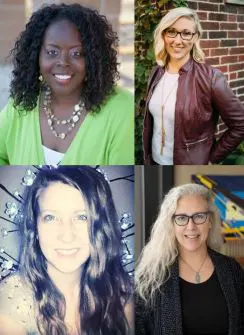 In this episode, Chequita Brown talks with Kate Danielson of the organization Foster Progress, as well as with Anna Wandtke and Tricia Wagner of Rock Valley College in Rockford, Illinois. The group discusses how to cultivate a foster-friendly culture at Illinois community colleges.
In this episode, Chequita Brown talks with Kate Danielson of the organization Foster Progress, as well as with Anna Wandtke and Tricia Wagner of Rock Valley College in Rockford, Illinois. The group discusses how to cultivate a foster-friendly culture at Illinois community colleges.
Navigating College as a Foster Care Alum
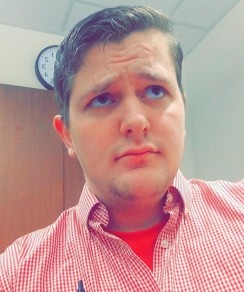 In this episode, OCCRL research assistant Chequita S. Brown talks with Jonathan Stacy, a sophomore at Heartland Community College who is pursuing his studies and a possible career in criminal justice.
In this episode, OCCRL research assistant Chequita S. Brown talks with Jonathan Stacy, a sophomore at Heartland Community College who is pursuing his studies and a possible career in criminal justice.
Listen to the podcast and view the transcript.
Key Elements to Successfully Connecting Foster Care Youth to Educational Resources for Postsecondary Success
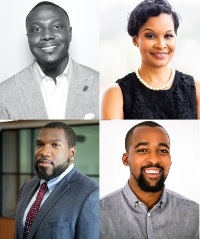 In this episode, Nathaniel Stewart talks with Mauriell Amechi, Regina Gavin Williams, and Blayne Stone Jr. about how the transitions and pathways to postsecondary education are similar and different for Black former foster care students. The scholars also discuss key elements to successfully connect foster care youth to educational resources that help advance the postsecondary education opportunities for this student population.
In this episode, Nathaniel Stewart talks with Mauriell Amechi, Regina Gavin Williams, and Blayne Stone Jr. about how the transitions and pathways to postsecondary education are similar and different for Black former foster care students. The scholars also discuss key elements to successfully connect foster care youth to educational resources that help advance the postsecondary education opportunities for this student population.
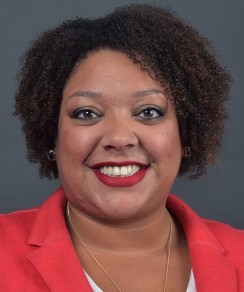
Maddy Day
The Impact of Campus-Based Support Programming on Foster Care Collegians' Postsecondary Access and Retention
In this episode, Chequita Brown of OCCRL talks with Maddy Day about the Fostering Success initiative in Michigan and the impact of campus-based support programming on foster carecollegians' postsecondary access and retention.

Patricia Palmer
How Youth-in-Care in Illinois Can Access Educational Resources to Pursue a Postsecondary Education
In this episode, OCCRL research assistant Chequita Brown continues the conversation on foster care youth by talking about with Patricia Palmer about accessing available resources in Illinois for youth-in-care who want to pursue a postsecondary education.
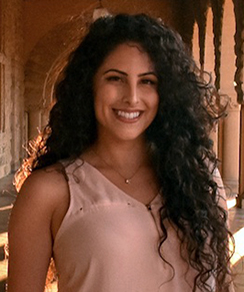
Nidia Ruedas-Gracia
Conceptualizing 'Sense of Belonging' Among Students From Historically Minoritized Racial Groups Within Higher Education
In this episode, Colvin Georges Jr., a research associate at OCCRL, talks with Dr. Nidia Ruedas-Gracia about what it means to have a sense of belonging and discusses her research in this area. They also discuss how a sense of belonging affects college students from historically minoritized racial groups.
Postsecondary Programs and Services for Current and Former Foster Care Youth in California
By Chequita S. Brown, Nidia Ruedas-Gracia, and Eboni M. Zamani-Gallaher
This brief highlights postsecondary programs and services in California that support youth in care, in addition to young adults who are aging out of foster care. Read more.
Tracking College-to-Career Pathways for Foster Youth
By Chequita S. Brown
In this OCCRL Thought Paper, Chequita S. Brown relates how tracking the data of students with foster care experience helps to recognize them as a legitimate student population. She offers recommendations on how to do this and conveys the many obstacles that can hinder the academic and career success of foster youth. Read more.
Black Youth in Foster and the School-Prison Nexus
By Royel Johnson
In this OCCRL Feature Brief, Dr. Royel Johnson argues that the foster care system, and more specifically congregate care facilities, are part and parcel to the enhancement of carceral state power. Read more.
Postsecondary Programs and Services for Current and Former Foster Care Youth in Illinois
By Chequita S. Brown, Eboni Zamani-Gallaher, Nidia Ruedas-Gracia, and Nathaniel M. Stewart
This research brief provides an overview of programs and services that helps strengthen postsecondary pathways for current and former foster youth in Illinois. Read more.
Foster Youth and Basic-Needs Insecurity
By Dra. Nidia Ruedas-Gracia, Chequita S. Brown, Dr. Mauriell Amechi, Dr. Eboni Zamani-Gallaher, and Nathaniel M. Stewart
This article discusses how COVID-19 has intensified the vulnerabilities of foster youth and former foster youth, many of whom are Black, Native American, Alaska Native, and multiracial children who have a higher rate of placement into foster care than White youth (Federal Interagency Forum on Child and Family Statistics, 2016). Read more.
(From the Fall 2020 UPDATE on Research and Leadership)
Exploring Equity in Postsecondary Education
By Heather L. Fox, Eboni M. Zamani-Gallaher
This chapter examines how postsecondary practitioners are encouraged to work collaboratively with child welfare agencies and other community-based organizations to identify and implement culturally responsive supports for former foster youth to promote early academic achievement. Read more.
The Forgotten Students: COVID-19 Response for Youth and Young Adults Aging Out of Foster Care
By Mauriell H. Amechi
This policy brief outlines recommendations for Congress to consider regarding the country's COVID-19 response, in an effort to prioritize the availability of essential supports and resources for youth and young adults who are aging out of foster care. Read more.
Illinois Higher Education and Workforce Equity Initiatives You Should Know
The state of Illinois faces a host of social and economic challenges. Workers are aging, labor-force participation rates are decreasing, and middle-wage jobs are disappearing, giving rise to an increasingly stratified labor market (Illinois Future of Work Task Force, 2022). Marked disparities in postsecondary educational attainment persist—especially with respect to Black, Hispanic, low-income, rural, and working adult students (IBHE, 2021). The COVID-19 pandemic has exacerbated these long-standing inequities. For instance, recent reports show that between the fall of 2019 and the fall of 2020, community college enrollment dropped 16% for Black students, 17% for Latinx students, 13% for Asian students, and 12% for white students (Advance Illinois, 2022). This is particularly concerning as community colleges serve Black, Hispanic/Latinx, low-income, rural, and working adult students at proportionally higher rates than public four-year institutions in the state.
Given the inextricable links between educational attainment, workforce participation, community prosperity, and individual quality of life, it is imperative that these equity gaps are addressed. Around the state of Illinois, several initiatives have been put in place to do just that.
Here are four you should know about.
Illinois Education and Career Success Network Leadership Communities
The Illinois Education and Career Success Network (formerly known as the Illinois 60 by 25 Network) was launched in 2013. This collaboration between Advance Illinois, Education Systems Center at Northern Illinois University (EdSystems), and the Illinois Student Assistance Commission (ISAC) provides a statewide infrastructure for local initiatives that focus on increasing postsecondary attainment and career success in Illinois. Local initiatives that meet the network’s Leadership Communities criteria receive strategic, technical, financial, and professional support from the network. To date, there are 18 Leadership Communities throughout the state partnering with high schools, local businesses, and institutions of higher education to increase college readiness, provide support in the college-going process, assist with career exploration, and match skill development with local workforce needs.
Illinois Equity in Attainment Initiative
In 2018, the Partnership for College Completion (PCC) launched the Illinois Equity in Attainment Initiative (ILEA) to “eliminate racial and socioeconomic achievement gaps by 2025 and aggressively prioritize increasing completion rates.” To date, PCC has partnered with 25 public and private two- and four-year postsecondary institutions that collectively enroll 40% of all Illinois undergraduates and 68% and 42% of all Illinois’ Latinx and Black undergraduates, respectively. Each ILEA member institution has appointed a dedicated leadership team and developed an institutional equity plan. Each plan contains strategic objectives and plans to evaluate progress toward stated objectives. PCC provides support for ILEA member institutions by way of regular meetings, needs assessments, and best-practice sharing.
Workforce Equity Initiative
The Workforce Equity Initiative (WEI) is a statewide grant partnership between the Illinois Community College Board (ICCB), local community colleges, and the Illinois Legislative Black Caucus. WEI is designed to “expand skills gap training for minority students in distressed communities.” The program works by providing students with support services to remove barriers to enrollment and completion in workforce training programs in “high skilled, high wage, and in-demand occupations, allowing participants the ability to improve their livelihoods and earn 30% above the living wage.” Now in its third year of funding, the WEI program includes 18 participating community colleges that serve communities with at least a 20% poverty rate, 75% free lunch participation, 20% Supplemental Nutrition Assistance Participation, and unemployment rates at or above 1.2 times the national average. To date, over 6,500 students have participated in the WEI program, with 67% of program completers finding employment.
House Bill 5464
One of the newest state-level initiatives is House Bill 5464, signed into law by Governor Pritzker in June of 2022. Effective immediately, HB 5464 requires the state’s public universities and community colleges to “develop and implement equity plans and practices to increase the access, retention, completion, and student loan repayment rates for minority students, rural students, adult students, women, and people with disabilities who are traditionally underrepresented in education programs and activities.” HB5464 is one of three pieces of legislation aimed at addressing educational disparities in the state of Illinois, with the others being Senate Bill 3991 and House Bill 4201. OCCRL Director Lorenzo Baber is a member of the Equity Plan Advisory Committee. The implementation of HB5464 at the state level is being overseen by the Illinois Board of Higher Education (IBHE) and the Illinois Community College Board (ICCB).
The initiatives referenced above represent a collective effort among communities, schools, postsecondary institutions, research centers, policy organizations and the Illinois Legislature to address longstanding educational disparities. How and to what extent these efforts will move the needle will only become clear in time, but in this moment one thing remains clear: While other states are dismantling Diversity, Equity, and Inclusion (DEI) efforts, Illinois is standing strong in its commitment to equity.
Are there other educational and workforce initiatives that we should be aware of? Let us know in the comments!
Dr. Collins is an assistant professor in the College of ACES and an OCCRL affiliate member.
References
Advance Illinois. (2022). The state we’re in: A look at the impact of COVID-19 on education in Illinois. https://www.advanceillinois.org/research-hub/the-state-were-in
IBHE. (2021). A thriving Illinois: Higher education paths to equity, sustainability and growth. Illinois Board of Higher Education. https://ibhestrategicplan.ibhe.org/pdf/A_Thriving_Illinois_06-15-21.pdf
Illinois Community College Board. (n.d.). Workforce equity initiative. Retrieved February 20, 2023, from //www.illinoiswei.org
Illinois Education and Career Success Network. (2023). Success network leadership communities. https://ilsuccessnetwork.org/community-profiles/
Illinois Future of Work Task Force. (2022). Future of Work in Illinois. https://www.economicsecurityil.org/fow-report
Illinois.gov. (2021). Gov. Pritzker signs legislation to expand access to higher education. https://www.illinois.gov/news/press-release.25010.html
Partnership for College Completion. (2023). Illinois equity in attainment initiative. https://partnershipfcc.org/college-and-university-partnerships/illinois-equity-in-attainment-initiative/